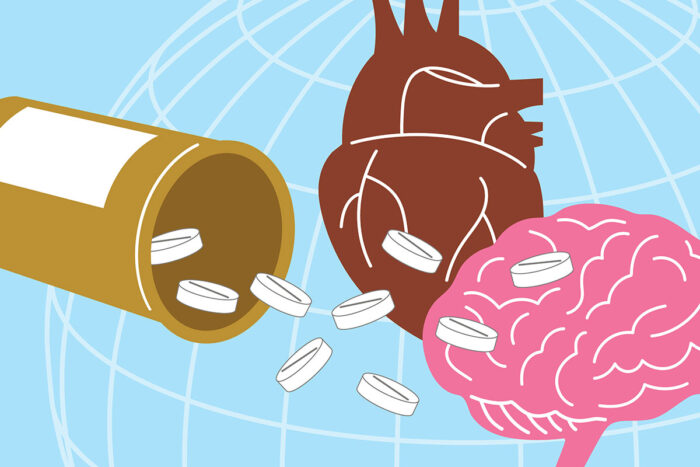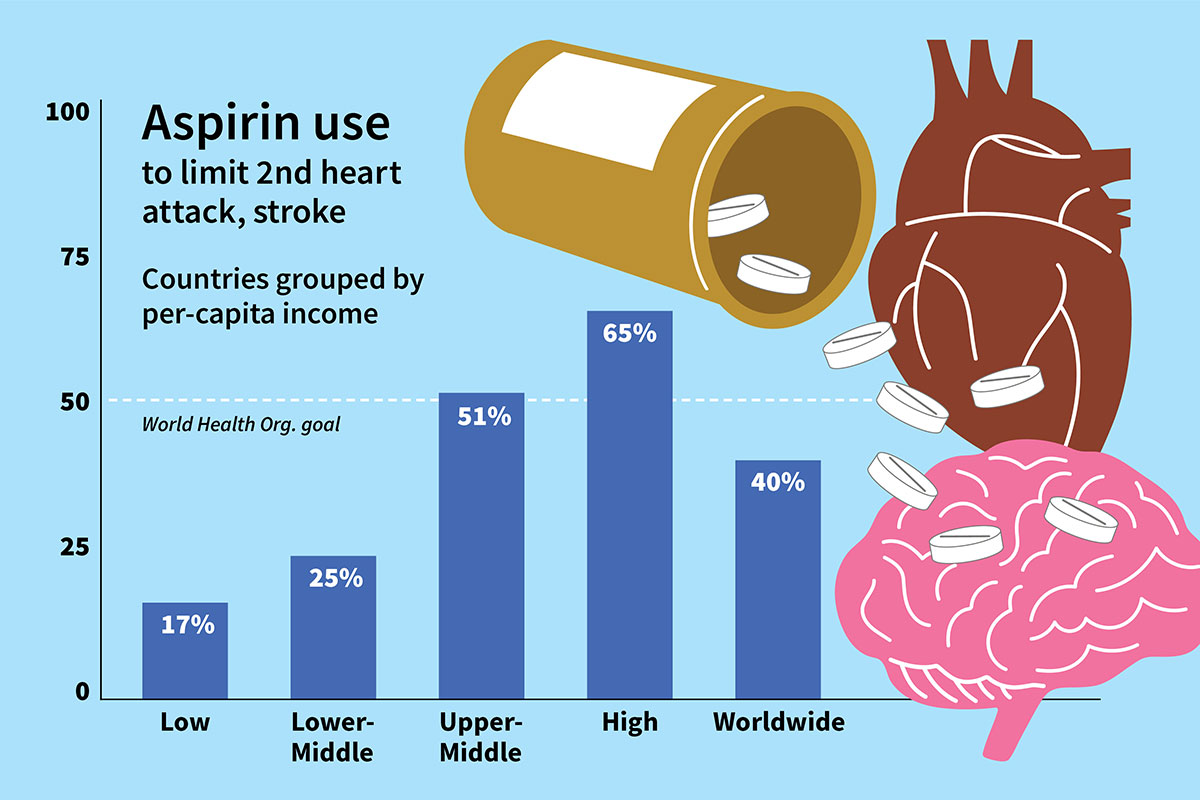Visit our news hub
Daily aspirin use is inexpensive and could reduce cardiovascular deaths worldwide

Fewer than half of people worldwide who have had a heart attack or stroke take a daily aspirin to prevent a recurrence, according to a new study led by researchers at Washington University School of Medicine in St. Louis. Increasing daily aspirin use among these patients may help reduce cardiovascular deaths.
People who have had a heart attack or stroke know that taking a daily aspirin can help prevent a recurrence, but according to a new study led by researchers at Washington University School of Medicine in St. Louis and the University of Michigan, despite aspirin being inexpensive and having clear benefits in such situations, fewer than half of people worldwide who have had a heart attack or stroke take the drug.
The study will be published in JAMA on August 22nd.
Cardiovascular diseases, including heart attacks and strokes, are the leading cause of death worldwide. Studies conducted in the 1970s and 1980s established that antiplatelet therapy, including aspirin, could reduce the risk of a second cardiovascular event, such as a second heart attack or stroke, by about one-quarter. Daily aspirin has been recommended for this purpose ever since. Daily aspirin therapy is also generally affordable. In the United States, a one-month supply of baby aspirin (81 milligrams per dose) costs between $2 and $8, depending on the retailer and the amount purchased.
“Heart attack and stroke survivors are often at high risk for recurrence,” said San Geun-e Yu, MD, a cardiovascular disease researcher in the cardiovascular division at Washington University School of Medicine and lead author of the paper. “In fact, many people die from recurrent attacks. Aspirin is one effective and relatively low-cost option to reduce the chance of recurrence in people with cardiovascular disease, but most people who could benefit from taking an aspirin daily don’t take it.”
Yu said the new study doesn’t explain why aspirin is used so little, but there are likely a number of overlapping explanations, including differences in access to health care in general, inconsistent messaging about the drug’s use, and the fact that aspirin is not always available over the counter and requires a prescription in some countries.
Despite aspirin’s benefits, the study found that in low-income countries, only 16.6% of people who had a first heart attack or stroke were taking it to prevent a second heart attack or stroke, compared with 24.5% in low-middle-income countries. That figure rose to 51.1% in upper-middle-income countries and 65% in high-income countries, including the United States.

A new study finds that only 40% of eligible patients worldwide take an aspirin daily to prevent a second heart attack or stroke. Broken down by per capita income, the data shows that aspirin use is even lower in low-income countries. The World Health Organization has set a goal that at least 50% of all eligible people take an aspirin daily by 2025. Graphic: Mike Waughl/University of Washington
Many factors contribute to the risk of heart attack and stroke, including smoking, diabetes, unhealthy diet, genetics, lack of exercise, obesity, and even air pollution. Aspirin thins the blood and prevents tiny blood cells called platelets from forming clots. These clots can block arteries and reduce the amount of oxygen-rich blood being transported to vital organs. Such blockages can also lead to other complications, such as heart attacks and strokes.
Researchers including senior author David Flood, M.D., Ph.D., assistant professor of medicine at the University of Michigan Hospital, analyzed data from national health surveys conducted in 51 low-, middle-, and high-income countries. The surveys included questions about cardiovascular disease history and aspirin use. The study included 125,505 participants, of whom 10,590 self-reported a history of cardiovascular disease.
An earlier study by a different research group, the Urban-Rural Epidemiology Cohort Study, published in 2011, found similarly low rates of aspirin use. Despite international efforts to improve access to cardiovascular medications, including aspirin, from 2011 to 2023, aspirin use remains significantly low. Yu said this lack of progress highlights the urgent need to continue developing and implementing interventions to promote aspirin use.
“Ten years from now, we would expect aspirin use to be more widespread, but nothing has really changed,” Yu said. “This study is about a disease process that affects a lot of people, regardless of where they live. We must remember that this research has the potential to benefit a huge number of people.”
Yoo said interventions need to take a multifaceted approach and take into account the context in which they are implemented. Such an approach could include repurposing systems-level strategies that have been implemented to manage other chronic diseases, such as HIV/AIDS.
“Especially in low- and middle-income countries, they often have good infrastructure in place to care for patients with HIV and other endemic diseases,” Yu said. “Rather than reinventing the wheel, we can look at re-architecting it so that it’s part of the existing system to also address cardiovascular disease, which is a complication of heart attack and stroke.”
Where aspirin is readily available, interventions could be targeted to pharmacies and GPs to make it more accessible to targeted patients.
“In order to make interventions, we need to understand what’s actually going on, and that’s what we’re trying to find out in this study,” Yu said. “Then we can start thinking about how to develop evidence-based strategies to increase aspirin use to save lives.”


